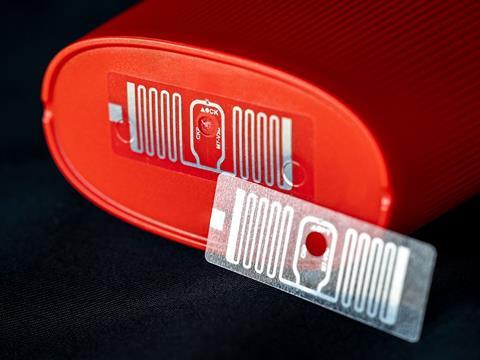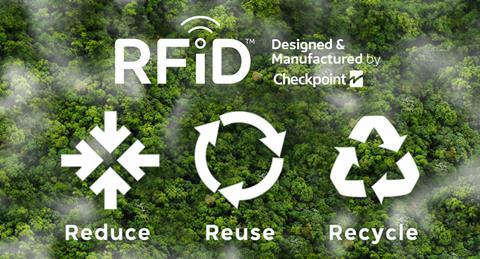In our latest Spotlight, Checkpoint Systems tells us how RFID tags can help companies reach sustainability goals by boosting Reduce, Recycle and Reuse.

In an era where sustainability is no longer a choice but a necessity, the principles of Reduce, Recycle, and Reuse (3Rs) stand as pillars of the circular economy. The new EU packaging regulations have intensified the need for companies to align with these principles, aiming to reduce waste, increase reuse, and enhance recycling. In this evolving landscape, RFID technology emerges as a crucial enabler, offering innovative solutions to meet these sustainability goals.
Reduce: Minimizing Waste with RFID
RFID tags are revolutionizing the way companies manage waste and overstock. By providing precise inventory monitoring, RFID technology helps prevent food waste and reduce landfill waste. Notably, the use of RFID tags in grocery retail processes can cut food waste by up to 60%, according to Checkpoint pilot test result with RFID tags.
A practical example is the comparison between two RFID tags developed by Checkpoint Systems: Zephyr and Vortex. The Vortex tag is approximately 56.8% smaller than the Zephyr tag (Zephyr: 54x34mm, Vortex: 44x18mm), demonstrating significant material reduction without compromising functionality. This reduction in tag size translates directly into less material waste and a more sustainable tagging solution.
Recycle: Enhancing the Recycling Process
RFID tags not only assist in reducing waste but also play a significant role in the recycling process. Studies have shown that packaging made from paper/board (PTS) and plastic (Interseroh) with RFID labels applied, can be recycled without impacting the domestic recycling programs. This compatibility ensures that RFID tags do not hinder the recycling of packaging materials, thus supporting the overall recycling efforts.
Global initiatives further underline the importance of RFID in recycling. Checkpoint Systems, a key player in the RFID industry, is replicating successful recycling practices across the Americas and APAC. Additionally, Checkpoint’s participation in the RAIN RFID “Plastic Packaging Tiger Team” aims to support end-users’ recycling goals, showcasing the global commitment to sustainable practices.

A success story from one of the greatest retailer sporting goods, illustrates how RFID technology enhances recycling efficiency. By using an RFID reader, recycling companies can automatically retrieve the identity of a garment and access cloud-based data on the fabric’s origin and composition. This automated identification streamlines the sorting and recycling process, ensuring that materials are accurately processed and reused.
Reuse: Facilitating Product Reuse with RFID
The reuse of products is another critical aspect of sustainability where RFID technology makes a substantial impact. A prominent case study involves one of the major fast-food chains, which recently used RFID to collect and reuse tableware. This practice not only reduces waste but also promotes efficient waste management and sustainable practices.
Beyond these, RFID technology is widely adopted in the retail and hospitality sectors to facilitate the collection and reuse of materials. By ensuring that products are tracked and managed throughout their lifecycle, RFID helps companies maximize the lifespan of their assets, further embedding sustainability into their operations.
Adopting technologies like RFID is paramount in driving a circular economy. These solutions not only contribute to a more sustainable future but also enhance operational efficiency and reduce costs for companies. As businesses worldwide strive to meet sustainability goals, implementing RFID tags in business processes becomes an essential step toward achieving the 3Rs: Reduce, Recycle, and Reuse.
Encouraging companies to integrate RFID technology into their operations will foster a culture of sustainability, driving significant environmental and economic benefits.

This content was sponsored by Checkpoint Systems.











